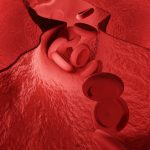Insomnia Associated with Heart Disease
Node Smith, ND
People suffering from insomnia may have an increased risk of coronary artery disease, heart failure and stroke, according to new research in the American Heart Association’s journal Circulation.
Previous observational studies linked insomnia with increased risk for developing heart disease
Previous observational studies have found an association between insomnia, which affects up to 30% of the general population, and an increased risk of developing heart disease and stroke. These observational studies were unable to determine whether insomnia is a cause, or if it is just associated with them, explained Susanna Larsson, Ph.D., lead study author and associate professor of cardiovascular and nutritional epidemiology at Karolinska Institutet in Stockholm, Sweden.
First-of-its-kind study on insomnia
In this first-of-its-kind study on insomnia, Larsson and a colleague applied Mendelian randomization, a technique that uses genetic variants known to be connected with a potential risk factor, such as insomnia, to reduce bias in the results. The 1.3 million participants with or without heart disease and stroke were drawn from four major public studies and groups.
Genetic variant findings
Researchers found genetic variants for insomnia were associated with significantly higher odds of coronary artery disease, heart failure and ischemic stroke – particularly large artery stroke, but not atrial fibrillation.
It’s important to identify the underlying reason for insomnia and treat it. Sleep is a behavior that can be changed by new habits and stress management,” said Susanna Larsson, Ph.D., lead study author and associate professor of cardiovascular and nutritional epidemiology, Karolinska Institutet in Stockholm, Sweden.
A limitation to this study
A limitation to this study is that the results represent a genetic variant link to insomnia rather than insomnia itself. According to Larsson, it was not possible to determine whether or not the individuals with cardiovascular disease had insomnia.
Source:
- Susanna C. Larsson, Hugh S. Markus. Genetic Liability to Insomnia and Cardiovascular Disease Risk. Circulation, 2019; DOI: 10.1161/CIRCULATIONAHA.119.041830
 Node Smith, ND, is a naturopathic physician in Humboldt, Saskatchewan and associate editor and continuing education director for NDNR. His mission is serving relationships that support the process of transformation, and that ultimately lead to healthier people, businesses and communities. His primary therapeutic tools include counselling, homeopathy, diet and the use of cold water combined with exercise. Node considers health to be a reflection of the relationships a person or a business has with themselves, with God and with those around them. In order to cure disease and to heal, these relationships must be specifically considered. Node has worked intimately with many groups and organizations within the naturopathic profession, and helped found the non-profit, Association for Naturopathic Revitalization (ANR), which works to promote and facilitate experiential education in vitalism.
Node Smith, ND, is a naturopathic physician in Humboldt, Saskatchewan and associate editor and continuing education director for NDNR. His mission is serving relationships that support the process of transformation, and that ultimately lead to healthier people, businesses and communities. His primary therapeutic tools include counselling, homeopathy, diet and the use of cold water combined with exercise. Node considers health to be a reflection of the relationships a person or a business has with themselves, with God and with those around them. In order to cure disease and to heal, these relationships must be specifically considered. Node has worked intimately with many groups and organizations within the naturopathic profession, and helped found the non-profit, Association for Naturopathic Revitalization (ANR), which works to promote and facilitate experiential education in vitalism.
Node Smith graduated from the National University of Natural Medicine (NUNM) in 2017, and is currently licensed as a naturopathic physician in Oregon and working towards becoming licensed in Saskatchewan, Canada as well.









